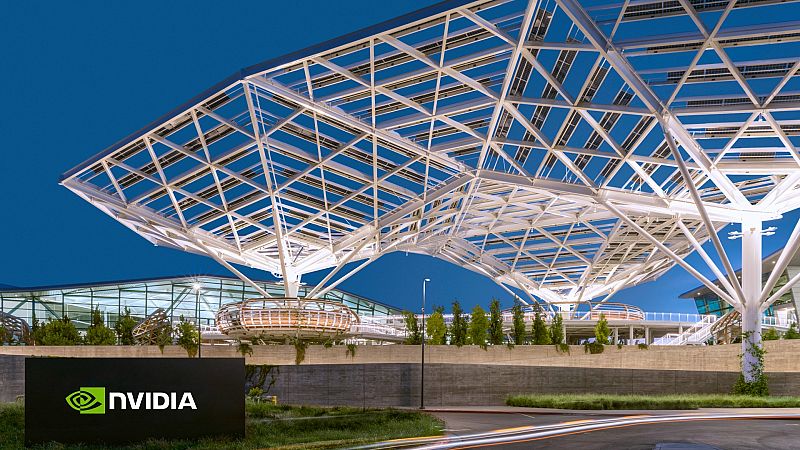
The S&P 500 dropped by 0.9% during early trade sessions. By 3:35 PM Central European Summer Time, the Dow Jones Industrial Average had fallen by 180 points, equivalent to a 0.4% decrease. Meanwhile, declines in Nvidia shares along with others within the semiconductor sector led the Nasdaq Composite index to fall leading the markets by 1.7%.
Nvidia stood out as the biggest heavyweight on the stock market and saw a decline of 5.7% following an announcement that the U.S. government has imposed restrictions on exporting its H10 chips to China due to concerns about their potential use in building a supercomputer. These limitations have the potential to reduce Nvidia's earnings for the first quarter by approximately $5.5 billion (€4.8bn), which includes costs associated with inventory and contractual obligations.
China and the United States, the globe's top economic powers, have been engaged in a trade conflict with increased tariffs and barriers affecting their mutual commerce. However, limitations on exporting AI-related semiconductor products are gaining backing across U.S. politics, beyond just those aligned with President Donald Trump.
Senator Elizabeth Warren, a member of the Democratic Party, requested from the U.S. Commerce Department earlier this week to "proceed promptly with limitations on the shipment of NVIDIA's H10 and similar cutting-edge AI chips" to China. She argued these technologies might bolster China’s military capabilities and surveillance activities.
Shares falter as Trump's ongoing tariff battle keeps stoking worries
Competitor semiconductor firm Advanced Micro Devices along with others in the sector declined significantly on Wednesday, with AMD experiencing a drop of 5.7%.
In Amsterdam, ASML saw its share price drop by 5.3%. The company, which supplies equipment to the semiconductor sector, reported ongoing expansion driven by artificial intelligence demands. "Nonetheless, the recently announced tariffs have escalated uncertainties within the broader economic landscape, and this state of flux is expected to persist for some time," stated CEO Christophe Fouquet.
ASML provided a prediction for their next-quarter revenue that did not meet the projections set by financial analysts.
The unpredictability surrounding Trump’s trade war has caused disruptions in planning strategies for businesses spanning various sectors globally. The situation is highly fluid; hence, United Airlines provided distinct financial projections for potential performance this year, with one scenario assuming a recession and another anticipating economic stability.
The airline stated it provided two forecasts as it’s “not possible to make predictions for this year with any level of certainty.”
The value of United's shares climbed by 1.2% following an announcement that the company had exceeded analyst expectations with higher profits for the most recent quarter. Additionally, they mentioned that reservations for upscale seating compartments and overseas trips have shown growth.
Fears of an US economic downturn continue, with household optimism declining.
A number of investors on Wall Street are preparing for a potential downturn due to Trump’s tariffs. He has stated that his aim with these tariffs is to encourage manufacturing jobs to return to the U.S. and reduce the trade deficit.
According to a survey conducted by Bank of America among global fund managers, the anticipation of an economic downturn stands at its fourth highest point over the past two decades.
Tariffs might also lead to an increase in inflation, albeit possibly temporary, as they may cause US importers to transfer the elevated expenses to their consumers.
Recent surveys indicate that US households are feeling increasingly pessimistic about the economy due to these new tariff measures. There’s concern that this negative sentiment might lead people to reduce their expenditures, potentially triggering an economic downturn all on its own.
If that were to happen, it certainly hasn’t yet. A report on Wednesday showed sales growth at US retailers accelerated by more last month than economists expected. Growth surged to 1.4% in March from April, up from 0.2% the prior month.
A lot of this increase might be due to American consumers hurrying to purchase items before tariffs had the opportunity to elevate their costs, particularly for cars and electronic goods.
Yields in the bond market dipped slightly after the release of the retail sales report. The rate for the 10-year Treasury decreased to 4.33%, down from 4.35% recorded late Tuesday.
On foreign stock markets, indices dropped throughout large parts of Europe and Asia.
The FTSE 100 dropped by 0.4% in London following the announcement that UK inflation decreased for the second consecutive month in March, primarily due to reduced natural gas costs.
Indices fell by 1.9% in Hong Kong, 1% in Tokyo, 1.2% in Seoul, and 0.7% in Paris as well.